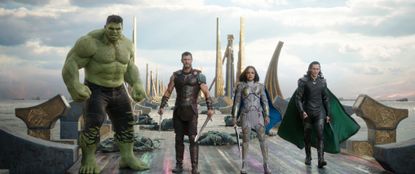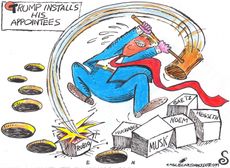Thor: Ragnarok is not a normal Marvel movie
This is an auteur's film


No film series can get as successful as the Marvel Cinematic Universe without eliciting its share of grumbles in the face of consistently enormous box office and consistently strong reviews. Now that Marvel is pumping out two or three of its own interconnected superhero movies each year, there's an established narrative that the studio relies on formulas that flatten out the input of individual filmmakers in service of the larger Marvel project.
It's a charge both unfair, in the sense that movies do not have to be idiosyncratic expressions of their makers' sensibilities to be entertaining, and accurate, in the sense that hardly any experienced director has made their most stylish or distinctive movie for Marvel. But some filmmakers have been more adept at navigating this post-millennial version of the studio system than others. It doesn't look easy: Even Joss Whedon, who had huge success with the first two Avengers films and to a large extent helped crystallize the Marvel house style, was seemingly worn out by clashing with the Marvel brass on Age of Ultron. On the next two Avengers pictures, he's out, and the less distinctive voices of Joe and Anthony Russo are in.
With this week's Thor: Ragnarok, New Zealand's Taiki Waititi issues a challenge to whatever internal style guidelines may be in place at Marvel (no one has seen them, but they often involve plentiful colors muted by digital cinematography, jokes at perfectly timed intervals, and lots of airships). His recent work includes the vampire comedy What We Do In The Shadows and the small-scale comic adventure Hunt for the Wilderpeople. Starting small isn't unusual for a Marvel director; the Russos' pre-Marvel experience was in sitcoms and a forgotten Owen Wilson comedy. But Waititi seems especially unconcerned with continuity management, brand protection, or getting hired for an even-bigger blockbuster.
Subscribe to The Week
Escape your echo chamber. Get the facts behind the news, plus analysis from multiple perspectives.

Sign up for The Week's Free Newsletters
From our morning news briefing to a weekly Good News Newsletter, get the best of The Week delivered directly to your inbox.
From our morning news briefing to a weekly Good News Newsletter, get the best of The Week delivered directly to your inbox.
His resulting film is easily the best of the three Thor movies, and one of the best Marvel movies, period.
Previously the Thor series has operated under sometimes-unflattering extremes of the Marvel creative process. The first film features the unmistakable stamp of director Kenneth Branagh, with its canted angles and quasi-Shakespearean drama, bumping up against delightful fish-out-of-water comedy and less delightful, sometimes clumsy nods to the developing Marvel Universe. The second film, The Dark World, carries the unmistakable stamp of a producer-driven franchise hiring a TV pro to just get the job done, already — and because Marvel has relatively high quality control, the job does get done, especially in the movie's inventive final stretch.
Waititi's crack at Thor sounds like more of the same on paper. Thor (Chris Hemsworth), the god of thunder, sees his planet/realm of Asgard apocalyptically threatened by his long-lost older sister Hela (Cate Blanchett), the goddess of death; their father Odin (Anthony Hopkins) is ultimately unable to help; his adopted brother Loki (Tom Hiddleston) offers to help but also schemes to advance himself; his fellow Avenger the Hulk (Mark Ruffalo) turns up for some Marvel Cinematic Universe synergy and comic relief, as does Stephen Strange (Benedict Cumberbatch) in a smaller role.
Much of Ragnarok takes place away from Asgard, on Sakaar, a dump planet presided over by the Grandmaster (Jeff Goldblum), who imprisons Thor and pits him against the Hulk in a gladiatorial match (Bruce Banner, the Hulk's human alter ego, hasn't been seen in a while). Thor must corral Hulk/Banner, Loki, and fellow Asgardian expat Valkyrie (Tessa Thompson) to escape Sakaar and return to fight off his Asgard-conquering sister.
This is all less formulaic than it sounds. Some Marvel movies defy genre by honoring Marvel formula above all others; Waititi mixes his genres more organically, with Sakaar resembling locations out of Star Wars or Mad Max while some of his wide-shot compositions (like Thor barely out-flying an angry fire-demon) and Mark Mothersbaugh's gloriously synth-driven score recall '80s fantasy epics. He also recasts Hemsworth's Thor as an overconfident goofball flummoxed whenever he can't hammer his way out of a sticky situation, forced to constantly negotiate buddy-comedy dynamics with less predictable allies.
While previous Thor movies aspired to a certain royal-family grandeur in the Thor/Loki rivalry, Waititi reimagines Thor's clashes with just about everyone in more comedic terms. But while the movie is heavier on jokes than almost any Marvel entry (and funnier than the similarly Mos-Eisley-as-farce Guardians of the Galaxy), it's often funny because of the humanity underneath, taking advantage of character histories and Marvel tropes rather than relying on them. When Thor and the Hulk are at odds, they're both throwing tantrums, trying to conceal their hurt feelings but revealing more of their wounded immaturity than ever. Valkyrie is a jaded badass not unlike Gamora from Guardians, but beyond Thompson's fine performance, the filmmakers ground her with unspoken details like her dingy mess of an apartment.
Some limitations still persist. Cate Blanchett's Hela chews some clearly delicious scenery, but she spends a lot of her time off in a second, less compelling movie than the one where Thor, Hulk, Loki, and Valkyrie bumble their way through a bizarre garbage-strewn dystopia. The movie's 130-minute running time takes a while to rev up (though to be fair, some of Waititi's smaller movies have moments of aimlessness that make them feel longer than they are). The Doctor Strange cameo, padding that running time, is both fun and a time-waster, and winds up a wash.
But the studio has gotten better at integrating this kind of extra material into its films — to a fault, even. Earlier Marvel projects have passages that feel like the post-credits bonus scenes shoving their way into the middle of the movie. In later films, the universe-connecting business proceeds so smoothly that it's the smaller, less comics-reliant moments that jut out from the Marvel machinery. When Waititi frames distinctive shots that don't depend on spectacle, like a conversation that alternates Thor and Banner in one straight-ahead frame and Valkyrie in another, it's so striking that, like a tantalizing cameo aimed at superfans, it creates a kind of hunger: More! More moments like that!
Ragnarok has about as many moments like that as seems possible within the Marvel framework, which is to say somewhat more than Spider-Man: Homecoming (which had a lot) and vastly more than recent Marvel part-ones like Ant-Man or Doctor Strange (both of which took more of a step-forward, step-back approach). Even the ebb and flow of personal style within the Marvel universe is, if not predictable, subject to certain patterns. It's striking to see that their trilogies about Iron Man, Captain America, and Thor can all be divided similarly: Each has an introductory chapter that feels distinct from its cousins; an installment where the requirements of Universe Service are particularly visible (Iron Man 2; Captain America: Civil War; Thor: The Dark World); and an installment that builds upon the established characters in effective and satisfying ways (Iron Man 3; Captain America: The Winter Soldier; Ragnarok).
So it's not that the Marvel movies lack a sensibility so much as they place their emphasis on their characters' and brand's sensibility moreso than a filmmaker's specific point of view. As mentioned, that doesn't make their movies bad, and it still leaves plenty of space for directors willing to play the game. Thor: Ragnarok feels like a Taika Waititi movie, and a very good one — in part because however briefly, it takes the god of thunder off the perpetual-motion machine of success.
Sign up for Today's Best Articles in your inbox
A free daily email with the biggest news stories of the day – and the best features from TheWeek.com
Jesse Hassenger's film and culture criticism has appeared in The Onion's A.V. Club, Brooklyn Magazine, and Men's Journal online, among others. He lives in Brooklyn, where he also writes fiction, edits textbooks, and helps run SportsAlcohol.com, a pop culture blog and podcast.
-
 Today's political cartoons - November 16, 2024
Today's political cartoons - November 16, 2024Cartoons Saturday's cartoons - tears of the trade, monkeyshines, and more
By The Week US Published
-
 5 wild card cartoons about Trump's cabinet picks
5 wild card cartoons about Trump's cabinet picksCartoons Artists take on square pegs, very fine people, and more
By The Week US Published
-
 How will Elon Musk's alliance with Donald Trump pan out?
How will Elon Musk's alliance with Donald Trump pan out?The Explainer The billionaire's alliance with Donald Trump is causing concern across liberal America
By The Week UK Published
-
 Walter Isaacson's 'Elon Musk' can 'scarcely contain its subject'
Walter Isaacson's 'Elon Musk' can 'scarcely contain its subject'The latest biography on the elusive tech mogul is causing a stir among critics
By Theara Coleman Published
-
 Welcome to the new TheWeek.com!
Welcome to the new TheWeek.com!The Explainer Please allow us to reintroduce ourselves
By Jeva Lange Published
-
 The Oscars finale was a heartless disaster
The Oscars finale was a heartless disasterThe Explainer A calculated attempt at emotional manipulation goes very wrong
By Jeva Lange Last updated
-
 Most awkward awards show ever?
Most awkward awards show ever?The Explainer The best, worst, and most shocking moments from a chaotic Golden Globes
By Brendan Morrow Published
-
 The possible silver lining to the Warner Bros. deal
The possible silver lining to the Warner Bros. dealThe Explainer Could what's terrible for theaters be good for creators?
By Jeva Lange Last updated
-
 Jeffrey Wright is the new 'narrator voice'
Jeffrey Wright is the new 'narrator voice'The Explainer Move over, Sam Elliott and Morgan Freeman
By Jeva Lange Published
-
 This week's literary events are the biggest award shows of 2020
This week's literary events are the biggest award shows of 2020feature So long, Oscar. Hello, Booker.
By Jeva Lange Published
-
 What She Dies Tomorrow can teach us about our unshakable obsession with mortality
What She Dies Tomorrow can teach us about our unshakable obsession with mortalityThe Explainer This film isn't about the pandemic. But it can help viewers confront their fears about death.
By Jeva Lange Published